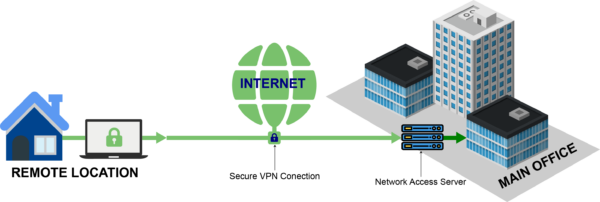Remote Access VPNs serve as a cornerstone for today’s remote working environment, providing secure connections between remote users and their organization’s network. This technology enables employees to access internal company resources from any location, just as if they were physically present in the office, ensuring business continuity and secure remote work capabilities.
Understanding Remote Access VPN
Remote Access VPN (Virtual Private Network) creates a private network across a public internet connection, offering a secure communication tunnel for remote users to access corporate resources. This technology encrypts data transmission, ensuring that sensitive information remains confidential and protected against unauthorized access.
Key Features of Remote Access VPN
Remote Access VPNs are characterized by several key features that enhance security and user experience:
- Encryption: Ensures that data transmitted over the public internet is unreadable to unauthorized users.
- Authentication: Verifies the identity of users attempting to access the VPN, often through passwords, digital certificates, or biometric data.
- Access Control: Limits user access to specific network resources based on roles and permissions.
- Ease of Use: Provides a user-friendly interface for connecting to the network remotely.
- Scalability: Can easily accommodate an increasing number of users without significant upgrades to the infrastructure.
Types of Remote Access VPN
There are primarily two types of Remote Access VPNs, distinguished by their use cases and implementation methods:
| Type | Description |
|---|---|
| SSL VPN (Secure Sockets Layer VPN) | Utilizes a web browser for access, requiring no specialized client software. Ideal for providing access to specific applications or services. |
| IPSec VPN (Internet Protocol Security VPN) | Requires installing client software on the user’s device. Offers comprehensive access to the network, suitable for users needing full network connectivity. |
Applications of Remote Access VPN
Remote Access VPNs are versatile, supporting a wide range of use cases:
- Secure access to corporate resources for remote and mobile workers
- Connectivity for branch offices to the main corporate network
- Secure file sharing among team members
- Encrypted communication for sensitive transactions
Challenges and Solutions in Remote Access VPN Usage
| Problem | Solution |
|---|---|
| Security Vulnerabilities | Implement strong encryption standards and multi-factor authentication. |
| Performance Issues | Optimize VPN servers and client configurations to ensure efficient data transmission. |
| Complexity in Management | Use centralized VPN management software for easier deployment and monitoring. |
| Compatibility Issues | Ensure the VPN solution is compatible with various operating systems and devices. |
Comparing Remote Access VPN to Other Technologies
| Feature | Remote Access VPN | Direct Access | Cloud Services |
|---|---|---|---|
| Security | High (encryption) | High (automated connections) | Variable (depends on provider) |
| Ease of Setup | Moderate | Complex | Easy |
| User Experience | Good | Seamless | Good |
| Scalability | High | High | Very High |
Future Trends in Remote Access VPN Technology
- Cloud-Based VPN Services: Simplifying deployment and management.
- Zero Trust Network Access (ZTNA): Providing more granular security controls.
- AI and Machine Learning: Enhancing security measures and user authentication.
- 5G Connectivity: Enabling faster and more reliable remote access connections.
VPN Integration with Remote Access
Integrating VPNs with Remote Access strategies enhances security and accessibility, allowing businesses to adopt a more flexible work environment. VPNs play a crucial role in extending network perimeters securely to accommodate remote workforces.
Further Reading and Resources
For more in-depth information about Remote Access VPN, consider exploring the following resources:
- Official Documentation of VPN Technologies: Vendor websites often provide comprehensive guides.
- Cybersecurity Frameworks: NIST and other cybersecurity organizations offer guidelines on implementing secure remote access solutions.
- Tech Forums and Communities: Platforms like Reddit, Stack Overflow, and specialized networking forums are valuable for practical advice and troubleshooting.
This guide aims to provide a thorough understanding of Remote Access VPNs, their importance in today’s remote working environment, the challenges they face, and future directions. By leveraging Remote Access VPNs, businesses can ensure secure, flexible, and efficient operations regardless of where their employees are located.


